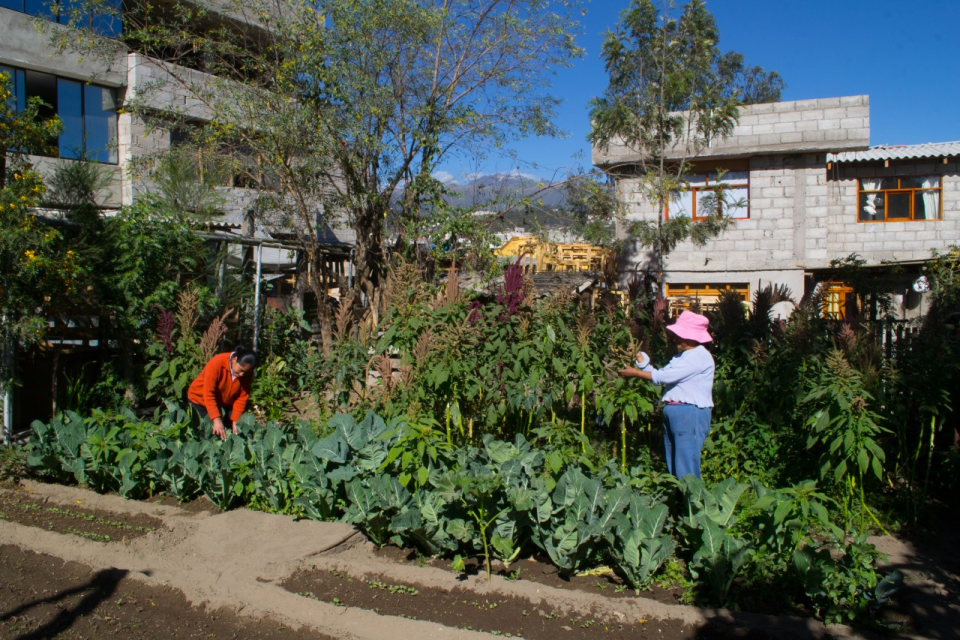
The Metropolitan District of Quito is the capital of Ecuador with a population of 2.6 million people, 63.8% live in the urban area which is organised into 32 urban parishes, or districts, and 33 rural and suburban parishes. Poverty in Quito affects almost 30% of the population, with chronic malnutrition affects 30% of children under 5 years old. Climate change, poverty and food provision are arguably the most pressing issues in the city.
In 2017 Quito municipality issued in The Resilience Strategy in which the food economy is one of the main pillars. Based on the project AGRUPAR (Participatory Urban Agriculture, acronym in Spanish), operating between 2002 and 2004, under the Sustainable Human Development Office, and since 2005, under the Economic Promotion Agency (ConQuito), promoted the creation of the Agrifood Pact of Quito which worked with all relevant stakeholders and became one of the main actors in the food policy of the city.
The project aims to tackle climate change, poverty and food provision, by supporting urban gardens on public or private land with community participation. The aims being food security and sovereignty, environmental management, employment and income improvement, social inclusion, sustainability and resilience.
AGRUPAR is an key project of the municipality, which in addition to contributing to food security and sovereignty, has contributed to improving the income of participants, particularly the low-income population, as well as generating savings by enabling the consumption of the food it has produced. Due to its integrated nature of agricultural and livestock activities; marketing of surpluses; food processing; solidarity exchange of the harvest; environmental management and contribution to urban agroecology ,it constitutes an important strategy for social cohesion as well. AGRUPAR contributes to manage the environmental, economic and social challenges of the city.
Quito's urban orchards have a production capacity of 1.35 million kgs of healthy food each year, of which 57 percent (769000 kgs) is consumed by producers and their families, and 43 percent (581,000 kg) is sold via various short supply chains. Each week, about 11 tons of fresh and healthy food are delivered to the city's most vulnerable neighborhoods. The substantial reduction of the carbon footprint within the food chain, due the proximity between producers and consumers, is one of the main climate change mitigation contributions of the initiative by minimizing the need for transportation, packaging, refrigeration and warehousing. In addition, the practice increases the urban biodiversity, carbon sequestration, rainwater infiltration and reduce of urban heat island effect.
The main impacts of AGRUPAR have been the improvement and availability of healthy food for the poorer urban population, the increment of economic opportunities for urban farmers, environmental benefits, and significant changes in consumers’ behavior by creating 4,400 gardens covering 63 hectares of the city. The develop,ment of an urban agriculture policy offers a holistic social approach, that can respond to the needs of different groups of the population; for instance, school-aged children can learn about the origins of food, nutritional diversity and the problem of food waste, adults with disabilities can learn skills and so be intergrated into wider society, woman-led households are enabled to work at home while taking care of their children, and migrants and refugees can be integrated into society through farming, and supported into the wider community.
- Increase Biodiversity.
- Increase achievements of biodiversity targets.
- Increase amount of green open spaces for residents.
- Changing image of the urban environment.
- Increase communities’ sense of ownership.
- Urban regeneration.
- Social justice and social cohesion.
- Increase wellbeing.
- Increase awareness of NbS solution & their effectiveness and co-benefits.
- Developing climate change adaptation; improving risk management and resilience
- Enhancing sustainable urbanisation
In 2013, Quito inaugurated its new international airport located in the rural parish of Tababela, 35km outside the urban area, leaving the open area of the former airport destined to be an urban park. The design of the park provides an area at the northern head for urban agriculture activities. AGRUPAR is proposing to implement an Urban Agriculture Interpretation Centre for co-productio,n dissemination and knowledge exchange to benefit more citizens, having productive areas for the community but also offering an opportunity to showcase different irrigation systems and cultivation techniques.
One of the main challenges of the program is the legal framework related to land use. Urban agriculture still needs to be recognized within the urban districts of Quito as part of the land management instruments, and efforts are being made to include it. Although, there is no restriction for urban food production, local farmers are faced with the risks of expulsion or termination of their leases since some may farm on land with no official titles, or without permission to use public space. As a result, urban agriculture may also be a risk for land trafficking and illegal occupation.
Municipality of Quito
Tannya Pico Parra.
Institute of Housing and Urban Development Studies at Erasmus University of Rotterdam & Pontificia Universidad Católica del Ecuador.
Alexandra Rodríguez Dueñas.
CONQUITO – AGRUPAR.
Ecuador
Further information
- 3. Good Health and Well-being
- 13. Climate Action



